“What is a War?”
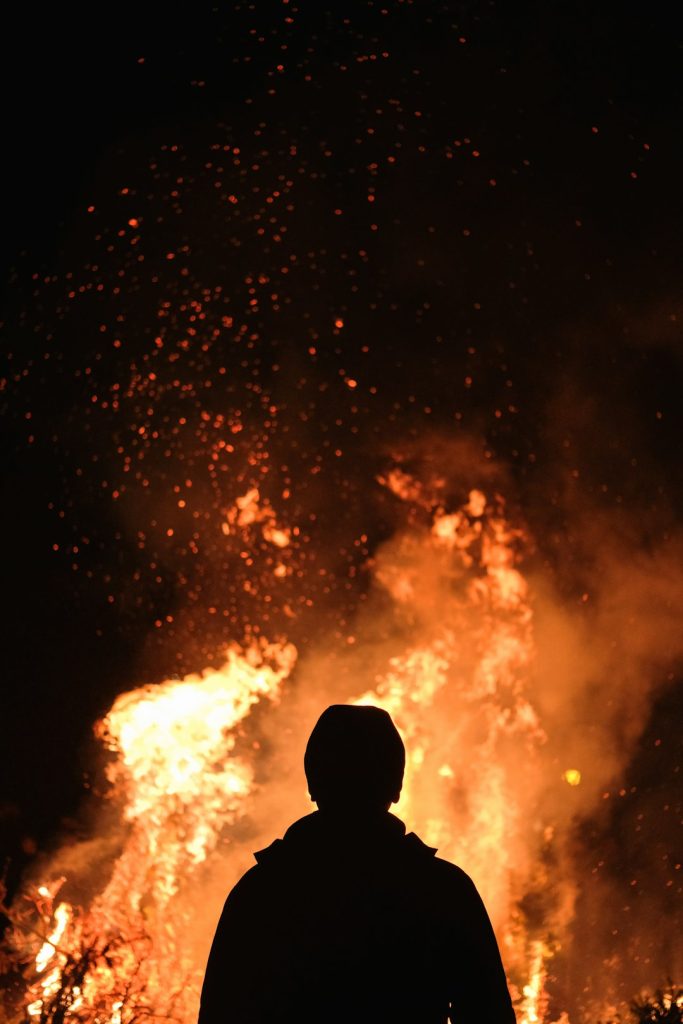
The Battle of Brentwood: Fourth Attack on US Soil

Since the wildfires (which, in my California childhood and girlhood, used to be called “forest fires”) broke out last week in Los Angeles, I have been living in a kind of anguish. It is not, of course, thankfully, the material agony faced by the millions of people now in a hellscape that used to be a paradise, or the unimaginable agony faced by the tens of thousands who have lost their homes and belongings.
Mine is an intellectual misery, rather, as I watch something unfold that is clearly, to me at least, the latest Pearl Harbor in our history.
It is so clear to me that events in Los Angeles constitute an attack that is part of a war. Pearl Harbor was the second attack on our homeland since the War of 1812; 9/11 was the third; and the Battle of Los Angeles is the fourth.
In order to make that statement, I have to explain again what a war is. Since April of 2020, when Brian O’Shea first explained to me “unrestricted warfare’, that Chinese Communist concept and goal, and that the CCP makes war in ways with which Westerners were unfamiliar, I have been persuaded by his argument that we are under attack unconventionally from multiple directions.
To recap: “unrestricted warfare” is a method of degrading the resources and morale of the enemy so thoroughly, bit by bit, that a shot need not be fired.
Brian gave me a dramatic image familiar to China hawks, in explaining this concept: we in the West expect to see war as an invasion or a bombing attack or to see enemy boots on the ground. We expect armies in uniforms on a battlefield, facing off.
But the goal of “unrestricted warfare” is to surround the enemy before the enemy even realizes what is happening.
Western warfare, he explained, is like chess: clearly marked kings and queens and knights squaring off directly against one another. The CCP’s “unrestricted warfare,” in contrast, is like the ancient Chinese game of Go, in which the goal is steadily, stealthily to surround, and thus paralyze, your opponent.
If you understand this concept, most of the last five years make sense. You are also more likely to survive what is — a war.
I do not mean to suggest, as those who follow my work know, that we are under attack by the CCP alone. The alliance is global and multifaceted: the WEF, WHO, Bill Gates, tech bros, “globalist technocrat oligarchs”, to hammer out a phrase; the aligned Bad Actors.
I have explained that the mRNA injections (the Pfizer version made by BioNTech, according to my original research, in a MOU with the Chinese Communist Party) and our pharmaceutical supply in general, now held hostage by China, are part of this “unrestricted warfare” against us. The “mandates”, that stripped us of thousands of able-bodied and experienced firefighters, police, soldiers and sailors, special forces operators, EMTs, and other health care workers — the key people who can protect “the homeland” in the event of an attack — were part of this warfare. The purchasing of farmland by China (and by its proxy, Canada) and China’s purchasing of farmland near 19 of our military bases in what The New York Post calls an “alarming” threat to our national security — ditto.
A treasonous administration in which the President’s son, Hunter Biden, accepted what may have been vast sums of money from China, unrelated to legitimate business dealings — has been part of this war. The Chinese “weather balloon” — per the Chinese Embassy and much of our legacy media — but “spy balloon,” per our intelligence community, that traversed the United States continent, and which no doubt mapped military installations and other infrastructure on its path, and about which we were told by our leadership not to worry, is part of this war. (Did you know, by the way, that this spy balloon had been permitted to use a US telecommunications company to communicate with China, on its journey? Neither had I. That kind of coordination used to be called both espionage and treason and would properly be a capital sentence for whoever facilitated these communications and this operation.)
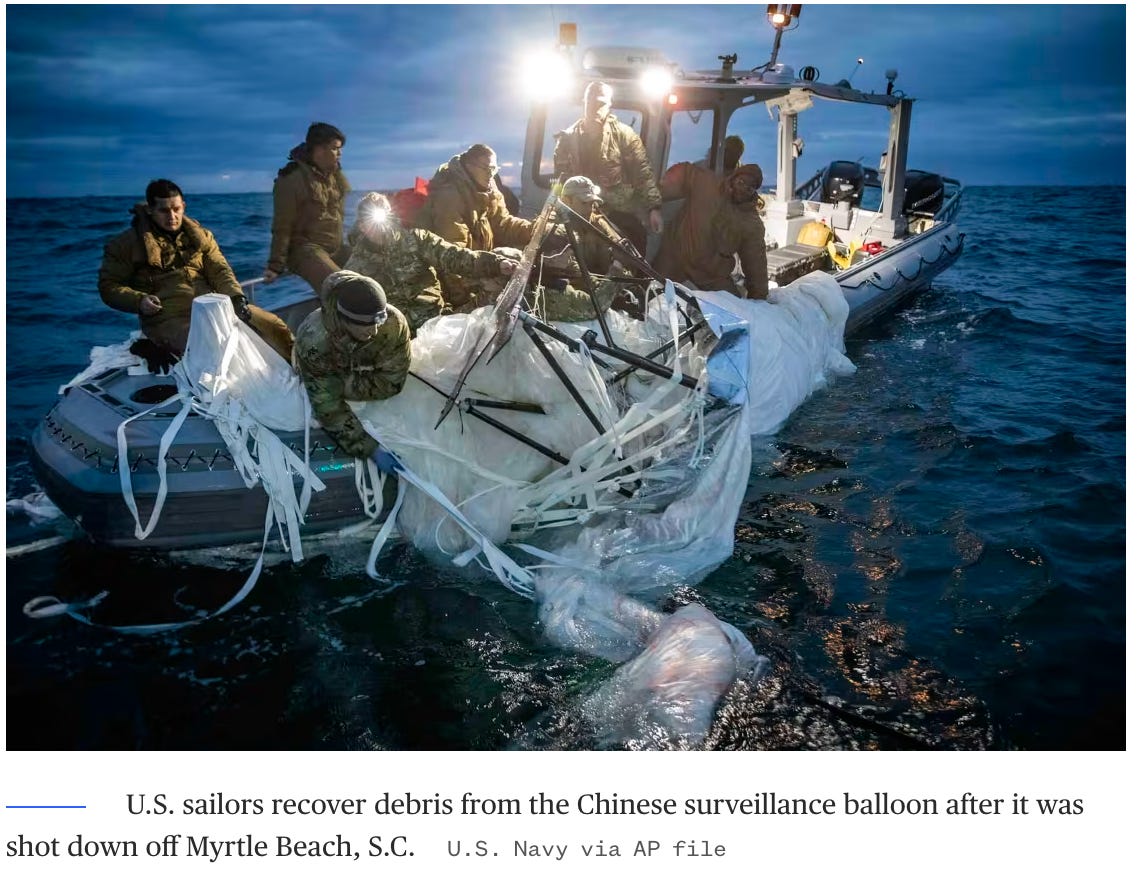
Of course, 16 to 30 million people, millions of them men of military age, with military bearing and training, and from nations such as Azerbaijan and Somalia and Afghanistan, that export mercenaries, entering the US via a staged three-nation operation underwritten by the US State Department and the United Nations, to be met by a State Department-funded “Welcome Corps”, are part of that war.
Of course these foreigners vanishing into the interior, or being housed in barracks-type accommodation, including at sensitive sites such as Chicago O’Hare airport, in housing paid for by the US Government, is part of this war.
That is all a staging operation.
Of course, the fact that some of them are terrorists or aligned with terrorist nations, and that, according to former border agent JJ Carrell, in the past they’d be interviewed by the FBI and deported, but now they are simply let go into the interior, is part of that war.
JJ Carrell testified to Congress that over 250,000 “special interest aliens” have now entered the United States.
Of course, “Sanctuary cities” that position these potentially violent men across our nation, are part of this war. Of course, the otherwise insane “defund the police” movement, that sprang up like crocuses in the Spring, out of nowhere, is part of this war.
Now – obviously – in Los Angeles, this stealthy war had moved from being latent, staging its various elements and features across our nation, to becoming “hot” or “kinetic,” as veterans such as my husband would say.
The painful aspect of this moment is that our country for the most part does not realize that there has been a “hot” attack on the US, covered via the narrative and reality of the Los Angeles wildfires.
Let me restate (as I feel I have been doing since I wrote my 2007 book about how democracies die, The End of America) that in crisis narratives designed to destroy Republics or Parliamentary democracies, a disaster can be real and also be exploited and manipulated.
What if an attack was waged on the US homeland, but no one realized it because it was simply called something else?
That is what we are seeing now, in my view: a war in plain sight, an attack on our second largest city, but one that is brilliantly concealed from the public by simply being narrated to obscure its nature.
Yes, the attack started with wildfires. But every year has wildfire season in California. What was different?
As fires broke out in Pacific Palisades last Tuesday, then continued day after day to spread to other areas in the city, LA Mayor Karen Bass was in — Accra, Ghana. Why? “The mayor was selected by President Joe Biden as one of his four-member presidential delegation to attend the inauguration of the African nation’s incoming president, John Dramani Mahama.”
It is unusual if not weird for a President to ask a city Mayor, who does not work for the Federal government, and who has no current connection to the US embassy in Ghana, to represent the US government on a trip of this kind. US Ambassador Virginia Palmer would represent the US typically at an inauguration in her assigned country.
Yet the Presidential delegation with its abruptly chosen member from LA, did not even make it onto the US Embassy in Ghana’s website.
The White House announced this four-person delegation on January 3 — just four days before the Ghanaian Inauguration on January 7. All of this is unusually sudden and somewhat random protocol.
Look at the delegation members:
President Joseph R. Biden, Jr. today announced the designation of a Presidential Delegation to attend the Inauguration of His Excellency John Dramani Mahama on January 7, 2025, in Accra, Ghana.
The Honorable Shalanda D. Young, Director of the United States Office of Management and Budget, will lead the delegation.
Members of the Presidential Delegation:
The Honorable Virginia E. Palmer, United States Ambassador to the Republic of Ghana
The Honorable Karen Bass, Mayor of Los Angeles, California
The Honorable Frances Z. Brown, Special Assistant to the President and Senior Director for African Affairs, National Security Council, The White House.
So — the Director of OMB, one of the most important and powerful agencies in the US, and the one that oversees funding and that is in charge of identifying financial corruption — odd, needed elsewhere, but ok; the US Ambassador to Ghana, yes of course; a top specialist on Africa in the National Security Council, yes, makes sense; and — the mayor of Los Angeles?
One thing in this picture does not belong.
Then – last Tuesday and Wednesday, as firefighters bravely sought to manage the spreading infernos, a key reservoir was empty. Why? Cosmetic repairs to its cover. The hydrants in the affluent neighborhood of Pacific Palisades were dry, as the Los Angeles Times reported.
“The Santa Ynez Reservoir was out of use and closed for repairs to its cover, leaving a 117-million-gallon water storage complex empty in the heart of the Palisades, […]
The large reservoir, had it been operable, could have helped with extending water pressure in the Palisades on Tuesday night, but only for a time, a former DWP general manager told Hamilton.”
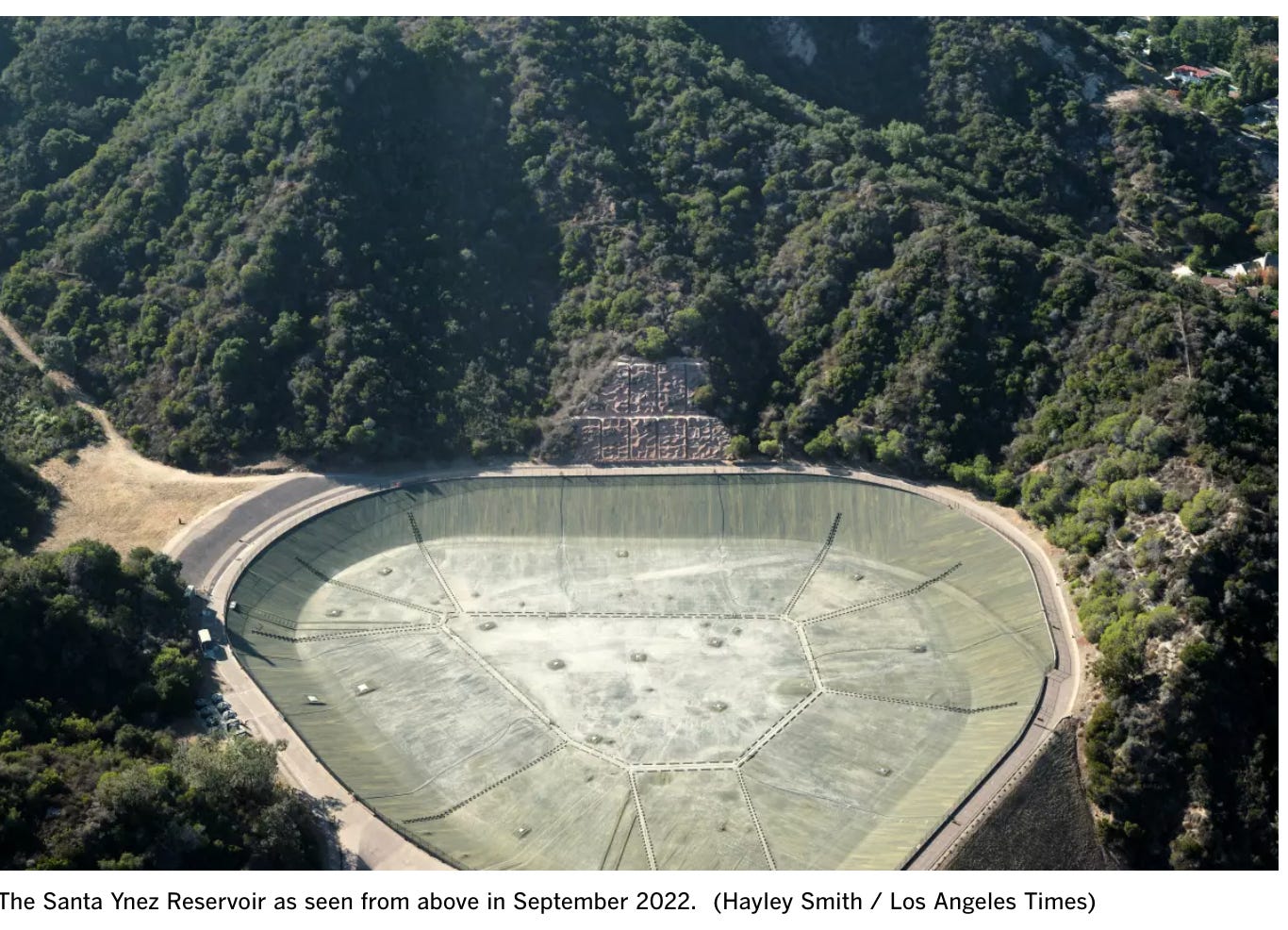
This kind of activity — creating a context of vulnerability – is standard in preparing for an attack in a “hot war.”
It is called sabotage: cutting the supply lines to a targeted population. You have to look at what actually happened in Los Angeles, rather than listen to what events are being called.
This all may be being called incompetence in the local media, but it looks like war preparation and war engagement to me. (This tactic of the leader being absent before a crisis by fire, is part of a playbook, it appears.
Then-Prime Minister Scott Morrison was also on vacation when wildfires devastated formerly protected acres in Australia in 2019, destroying millions of animals and precious ecosystems and thus opening these acres up for development and exploitation. He too, as DailyClout.io’s original reporting showed at the time, could have called for firefighting planes in a treaty with the US Forest Service, and chose not to do so).
Then — ten thousand homes were reported to have been destroyed, and by yesterday, ten people were confirmed dead (the number today has risen to 16).
180,000 people were reported to have been displaced, as multiple fires assailed and destroyed much of what had been some of the most valuable and beautiful real estate in the nation — the neighborhood of Pacific Palisades, along with iconic homes along the shoreline; and as fires threatened Mandeville Canyon and Brentwood and Encino and Pasadena; and destroyed Altadena.
As I write, multiple fires are still burning, pouring toxins into the atmosphere, and winds are expected to pick up tomorrow and Tuesday, threatening more destruction. The scenes were unforgettable; a raging red-magenta glow like the mouth of Hell stretched across the legendary, familiar, sparkling night horizon, and extended what seemed like miles into the jet-black sky.
By Friday, I began to notice that things seemed very strange in Los Angeles, even for a disaster area. I had multiple interviews for two consecutive days with people located in that city; and all five of them kept looking out of the window at flames and smoke that were drawing nearer as we did our work.
I kept saying, “Let’s wrap this up so you can be safe, or can go get to safety,” but all five of them, on two different days, did not cut short the interviews, and did not leave. As the inferno raged on, a dear friend in the city was begged to leave by her family, but she too did not move out of harm’s way. She stayed and stayed, though I too begged her to clear out, and to regroup from a position of safety. Another friend would text me images of flames thirty feet high at the end of his street, but he too did not leave.
I am not, God forbid, criticizing the choices or actions of people at great risk, and no doubt in a state of shock or PTSD, in Los Angeles. I might behave exactly the same way.
I am saying very gently that of all the war zones and conflict areas and natural disaster areas I have seen, and I have spent various times in my career covering areas in crisis, I have never seen people react that way when faced with grave danger.
The most traumatized people, in my experience around conflict areas and crisis areas ranging from an active war in Southern Lebanon to the post-Civil War era in Sierra Leone, to two wars and various terrorist attacks in Jerusalem, to my having experienced earthquakes myself in California as I grew up there, to my having lived 11 blocks from what had been the Twin Towers after 9/11 — people of all kinds are hypervigilant during attacks or during states of physical danger and seek to get away and to get their families to safety.
I could not pick up urgency in the people with whom I was in touch in LA; clips on social media, even of people who had lost a great deal, or who were at that moment threatened by fire, and even guests on national TV who were in the midst of events, also had an unusually calm affect.
I began to wonder what was causing this unusual calm and this inclination of people in the path of danger to stay where they were.
Was it poor or nonexistent messaging from the city leaders? Was it shock? Was it that the algorithms of social media feeds in LA were not showing the extent of the danger (this seemed confirmed by the friend in LA who could not see in her social media feed, the scary and rapid movement of the fires that I could see, while in Massachusetts at the time, in mine; I was reduced to texting her clips so she could more easily follow the progress of the fire)?
I began even to wonder if there had been a drug or sedative of some kind in the “mysterious fog” or the heavy geoengineering spraying that had blanketed key areas, including LA, prior to this event. That may sound nuts but like most things these days that should be out of bounds to ask, it is sadly not.
NASA has been confirmed to spray lithium (along with barium and aluminum) in the atmosphere for “vapor tracers” . I wondered even if technologies such as HAARP (also confirmed) that affect the ionosphere, also might somehow affect cognition or affect the recognition of risk.
Certainly the city was not messaging thoroughly or consistently about the dangers present, or about escape routes, or about how to leave safely. I could see that for myself.
Whatever the cause of this calm reaction of many of the population to a very great danger and devastation, the politics of this calmness bothered me greatly. Because running away from danger is a survival mechanism; and staying still or not reacting to danger, can make a population vulnerable. I saw gross negligence on the part of the city leaders in letting people be so quiescent.
But in war, downplaying danger or else not encouraging a safe exodus when needed, would be a tactic, not negligence.
I did not see other images and scenes, that one would expect to see from experience with other disaster areas. I did not, for instance, see images of mass migrations out of the city; I did not see scenes of people scrambling for gas, food and water.
180,000 people is a lot. It took 750 shelters in 17 states to house 235,000 people who were displaced by Hurricane Katrina in 2005. “What we are dealing with here is an evacuation effort on a scale never seen before,” said Texas Governor Rick Perry, who has welcomed thousands of displaced Louisianans to his adjacent state. “It is an immense challenge and will continue to be so for a number of months.” ‘
You remember the efforts to house those evacuees in 2005: it took months, and the media were full of desperate people leaving New Orleans, desperate people in shelters, desperate people in trailers. There was coverage in that disaster — as in North Carolina recently, and in other disaster areas for years in the past — of gas and food shortages; medicine shortages; crowding; shortages of beds; problems with sanitation and with exposure.
In LA? I don’t see coverage of any of these expected issues.
180,000 is more than a third of the population of the city of New Orleans in 2005. I asked on X where 180,000 displaced people in LA in 2024 — went. Where were they? Where had they gone?
I checked hotels in the city and nearby areas. Rooms were available and affordable. I did not see news coverage of the shelters — I checked the LA municipal website and there were only nine shelters — for a city of 3.821 million people.
Online, when I asked, ‘Where are the 180,000″?” I was told — often by bots and trolls — that they all had second or third homes. Then bots and trolls started yelling at me for asking.
In my career as a reporter, when bots and trolls start to become personally abusive as a reasonable question is being asked, there is a story to investigate. Something was off here. Even if a population that size moves from one neighborhood to another, or leaves the area, the mass movement will put pressure on infrastructure, gas, food and water supplies, schools and roads.
I then began to realize that there were other stories I was not seeing. As a reporter, on Day Four of a massive fire disaster, you would expect to A/ have an official count from the city, or from LAPD or from the coroner’s office, of the dead, injured and missing. B/ You would have coverage of conditions in the shelters. Are they adequate? Are there beds, diapers, medications? C/ You would have coverage of instructions from city officials, for getting safely out of the area or for staying put safely and dealing with fire, exposure, injuries, poor air.
I did not see those either, at least not on the municipal websites.
Other messaging was weird as well.
Mayor Karen Bass’ initial statement showed her bizarrely frozen when questioned by a reporter. Could this be a tactic, like the filing out of school boards when questioned by citizens, which I had witnessed, this time in order to reinforce learned helplessness in the population of LA?
Her later statement focused on rebuilding, and was given while strangely smiling. This too did not include basic information on resources to help her people survive. Karen Bass rejected the offer of assistance from FDNY, who are of course American, but accepted help from Mexican firefighters, who are of course not. So more highly trained men, who may or may not actually be firefighters, were coming into the beleaguered city from another nation.
All of that was weird.
Unless she, and that potentially tactical deployment, are also part of the war.
Coverage of the progress of the fires themselves moment by moment seemed to be left to citizen journalists, or exhausted firefighters, not presented hour by hour by city officials.
All of that was weird.
Unless LA is under attack in a hot war.
Then homeless people began lighting arsonist fires all over the city, and being let go or lightly punished. All of that was weird.
Unless they were not “homeless people” or “transient”, whatever the latter means, but rather prepositioned soldiers in a hot war.
I began to urge my friend (and people I did not know) to leave the area. I worried that the worst was still to come.
Part of my concern was the air quality. After 9/11 we were assured by the then-head of the EPA that “the air in lower Manhattan is safe to breathe.” This was a lie. To this day, loved ones have lung damage from the 9/11 toxins, and many first responders died a few years later from what they inhaled. The pollutants released by 10 thousand homes in flames, are overwhelmingly poisonous. Indeed LA inhabitants received air quality warnings.
The other concern I had was lawlessness. In war, the first attack is by bombs or artillery. Then there is attack on infrastructure, as we saw, to leave people without communications or to leave them in darkness.
Then come the militias, or the armed gangs.
I warned that the decline of the rule of law would mean the emergence of looters and gangs, and that in war, that would soon mean: rape, arson, burglary.
Reports on social media (again, not from LAPD at first formally, that I saw) revealed that hundred-member gangs on scooters, faces masked, were looting. The National Guard was called out, and responded with a sunset-to-sunrise curfew.
But what if these were not “just looters” but soldiers?
Read not the story about the war but the actions in a war.
Looting is part of war. Mayhem is a tactic in war. Curfews and restrictions of movement are part of population control in a coup and and are unconstitutional.
Alarmingly, three Humvees and military equipment were stolen from a military warehouse in Orange County. Which under non-war conditions, is just not possible.
But what if it is a hot war?
Then this is a supply drop, a tactical transfer.
A National Guard unit now stands guard outside my friend’s affluent neighborhood. It is a checkpoint. But it will not allow people in. It would not allow her in.
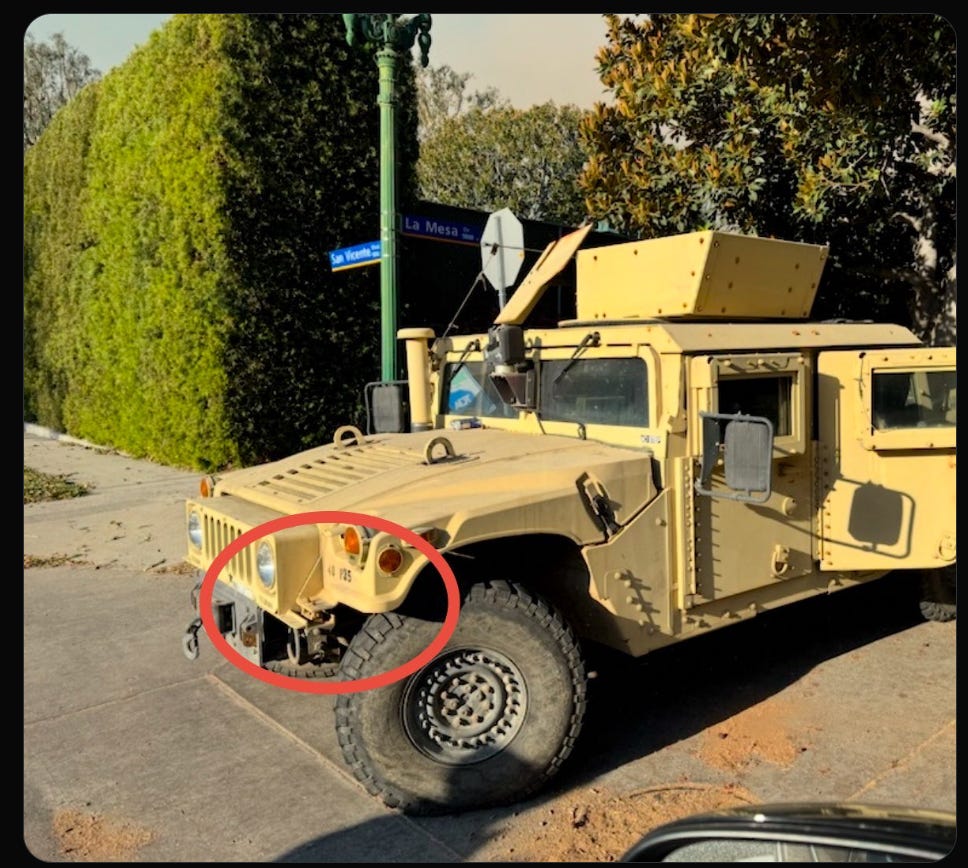
It will not allow homeowners in. Elsewhere in the city, homeowners are being escorted by Guardsmen to their homes to get their medications, or certain items, then escorted out — when they can get in at all.
I thought, if they can keep you from going in, they can keep you from coming out.
They can keep you from your home indefinitely.
I thought of my recent interviewee, Hawaii-based activist Michelle Melendez, who reported on current conditions in Lahaina. She said that now, many months later, there are still barricades around the burned homes in Lahaina and that the homeowners themselves are prevented from going to their own homesites.
No one is allowed in. And the permitting process has been changed in Lahaina so that rebuilding is onerous and too costly for most.
She also said that many people still are unaccounted for.
The rezoning process is reputed to be underway in Los Angeles.
Will LA be free again? Martial law, once imposed, is very difficult to lift.
Is another US city next to be targeted in a hot war?
I will stop there.
Commentators have noted that Los Angeles is being planned as a “fifteen-minute” “smart” city. Allowing the burning down of its most idyllic real estate, is a useful move in that direction.
Disempowering homeowners, even or especially the wealthiest and most influential, is a great way to kneecap the elite of a targeted country.
Imposing martial law or emergency law is Step Ten of my 2007 “Ten Steps to Fascism,” and it is a state I long predicted would precede the Inauguraton, so as to impede the transfer of power.
Who is Commander in Chief still? President Biden.
What happens if he says that the situation is too dangerous in California, to allow an Inauguration and a peaceful transfer of power?
War.
Or — more war.
I am worried that the checkpoints will never leave. I am worried that homeowners will be prevented from entering or else not be permitted out of their property. I am worried that the curfews won’t lift.
I am worried that there is no way that ten thousand homes can be incinerated and that there are only 16 deaths. There is some gigantic lie underway in this regard.
I am worried that there are no “Missing” signs or posts, which are normal to see at this point in a crisis. Are they being suppressed?
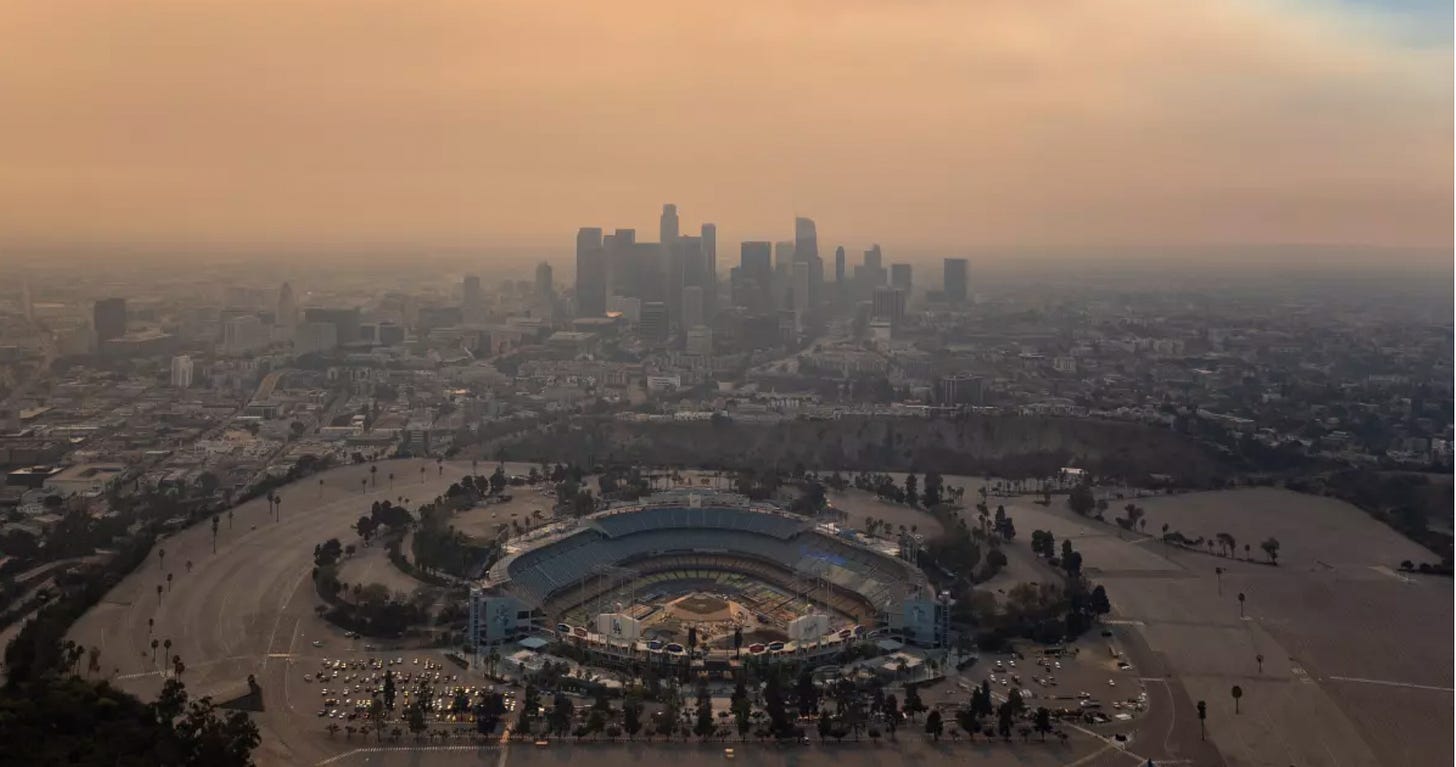
I am worried about no reporting from hospitals, burn units, shelters.
I am worried about where those 180,000 people actually are.
I am worried that America is clearly under attack in a “hot war” — and that no one, or almost no one, in America seems actually to see this.
Though our enemies surely do.
_________
Follow ‘Outspoken’ on Rumble! https://rumble.com/c/DrNaomiWolfOutspoken
Please Support Our Sponsors:
Birch Gold Group: “A Gold IRA from Birch Gold Group is the ultimate inflation hedge for your savings in uncertain times. Visit https://birchgold.com/dailyclout to see how to protect your IRA or 401(k).”
The Wellness Company: https://dailyclouthealth.com
Use code OUTSPOKEN for 10% off!
NativePath: “Electrolyte and sports drinks are doing more harm than good to your body. Stay healthy and hydrated with NativeHydrate… Visit https://nativehydrate.com/DailyClout to learn more.”
Patriot Mobile: “Visit https://patriotmobile.com/dailyclout for a FREE month of service when you switch!”
Order ‘The Pfizer Papers’ and Support Our Historic Work: https://www.amazon.com/dp/1648210376?&tag=skyhorsepub-20
Discover LegiSector! Stay up-to-date on issues you care about with LegiSector’s state-of-the-art summarizing capabilities and customizable portals. No researchers needed, no lobbyists, no spin. Legislation at your fingertips! Learn more at https://www.legisector.com/
One of our country’s most important freedoms is that of free speech.
Agree with this essay? Disagree? Join the debate by writing to DailyClout HERE.




